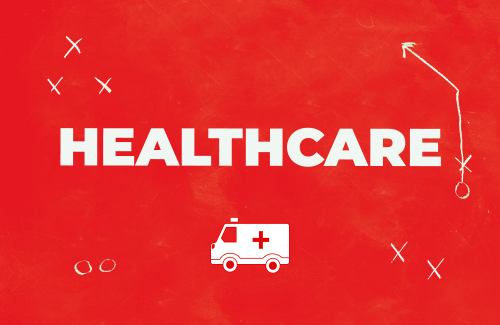A Healthcare Freedom Agenda
Affordable, Quality Care for Patients
These 16 recommendations are drawn from the Palmetto Promise Playbook report. You can view our policy agenda for other issues by clicking below.
Education | Energy | Tax & Budget | Work, Justice, & Quality of Life
REGULATORY REFORMS
- Eliminate Certificates of Need (CON) to increase supply and generate competition among medical providers. That means better quality and lower prices. There’s no other way to explain it. Certificates of Need laws require medical providers to obtain the approval of the state government and their competitors if they wish to open a new service or expand an existing one. Governor McMaster set CON aside temporarily during COVID due to the possibility that hospitals would need beds on an emergency basis but would be forbidden to add them.
- Expand Scope of Practice for Nurse Practitioners (NPs), as was done for Physicians Assistants (PAs). The General Assembly expanded Scope of Practice just this past year when it passed S.132 (now Act 32) covering Physicians Assistants (PAs). Some states have passed similar legislation or adopted regulations with the same effect for Nurse Practitioners (NPs). Steps like this allow medical professionals to practice at the top of their education and training by removing barriers that artificially limit medical practice. Removing these restrictions would be a godsend to rural and other areas facing shortages of medical professionals.
- Make certain COVID-19 Executive Actions Permanent. Governor Henry McMaster and his cabinet agency heads took a number of steps in the first few weeks of COVID-19 to make practicing medicine and seeing a doctor easier. These included speeding up the process of honoring Out of State Medical Licenses, clearing the way for more Access to Telemedicine and speeding up the process for renewing Professional Licenses.
- Make Agency and Licensing Board actions permanent. Actions taken during the early stage of the pandemic that set aside regulations for a number of professions should also be made permanent. These professions include: Pharmacy (Strep testing), Marriage & Family Therapy, Optometry, Speech Pathology, and Dentistry. Last session, a bipartisan bill was introduced into the S.C. House that would allow close contact providers regulated by the Department of Labor, Licensing and Regulation to be “exempt from renewal fees and continuing education requirements for their continued licensure until a period of one year after the date on which they are allowed to return to work by the Governor…” Only providers licensed before COVID would qualify. Such a move would take one more worry off the backs of workers still reeling from COVID. Enact COVID-19 responses from neighboring states. There were at least three initiatives that several states enacted that are not too late to pass here in South Carolina. They include:
- Fast track inactive physicians & nurses and medical student licenses to cover
- Provide Continuing Medical Education (CME) credit for COVID-related
- Pass the Uniform Emergency Volunteer Health Practitioner Act to allow physicians from other states full reciprocity
- Protect Direct Primary Care (DPC) to keep it growing. Direct Primary Care is nothing more than good old-fashioned cash for care. A growing number of medical practices in South Carolina are built on a model that offers their patients 24/7/365 treatment in return for a reasonable monthly subscription fee. This could be a game-changer for uninsured, underinsured, or government insured patients who need access to care.
- Don’t regulate Christian Healthcare Sharing–a more affordable way for some families to cover major medical expenses-as insurance. Instead of insurance, which pools risk, members of a healthcare sharing ministry simply pay each other’s medical bills. Government should stay out of their ministries.
PRICE & COMPETITION
- Enact a Price Transparency/Surprise Billing law (following Oklahoma’s example) so that patients can know the good faith cost of a service before it is performed. South Carolinians are frustrated that they can’t get a straight answer in advance on what their medical procedure will cost. One patient reported to the PPI office that a large provider told her that she could not be provided this information until the day before the procedure. Oklahoma has pioneered legislation to put an end to this, and a groundswell is breaking out nationwide. Recent polling shows that an incredible 87% of citizens favor legislation to ban surprise medical bills.
- Oppose insurance coverage mandates. One of the most egregious flaws of Obamacare (ACA) was the attempt by Washington to determine whether a health insurance policy were good or adequate. Federal or state governments should not load up insurance policies with mandated coverages that people don’t want and certainly don’t wish to pay for.
- Allow patients the right to price shop for healthcare procedures, with both the shopper and the insurance carrier sharing in the potential savings.
- Seek a Section 1332 Waiver. Also known as ACA Innovation waivers, if approved, a waiver would loosen some of the Federal Affordable Care Act (Obamacare) strings and allow South Carolina to test certain innovations. Since 2017, 15 states have had waivers approved and 6 more states have enacted legislation authorizing waiver submission. One state, Georgia, is awaiting federal approval on their submission. In 2018, the Trump Administration issued new guidance that relaxed some of the stricter guidance issued by the Obama Administration in 2015. The new guidance is welcome relief to those Americans who have had to deal with high premiums and limited choice as a result of Obamacare. It may be more challenging to obtain a waiver under a Biden Administration, but South Carolina should still seek it to address this broken program. Among the “waiver concepts” that the HHS indicated would be approved, South Carolina should consider including the following:
- New plan options. South Carolinians who are eligible for subsidies would then be able to buy the coverage of their choice.
- Risk Stabilization Program to lower premiums. This program would direct public resources to those with the greatest needs by creating a separate pool for those consumers, pro- viding relief to healthier individuals. 7 states have already enacted similar programs and seen premiums decrease as a result.
- Send subsidies to individuals. This waiver concept would allow for the disbursement of subsidies directly to individuals instead of to insurance companies. South Carolina should seize this opportunity to lower costs and increases choices for patients under 1332.







